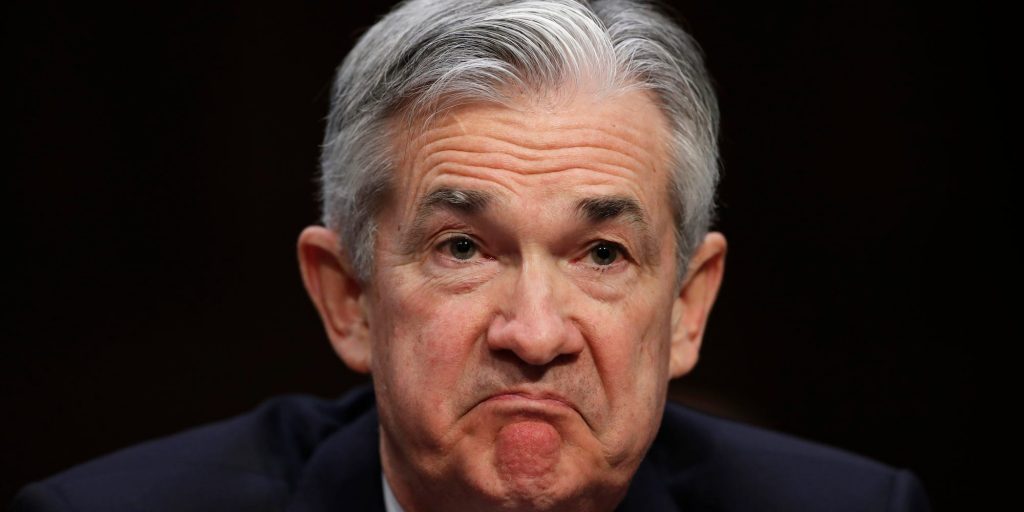- Global stocks fell Friday after Fed chief Jerome Powell said a 50-basis-point rate hike is on the table for May.
- Nomura said it now expects the central bank to raise interest rates by 75 basis points in June and July.
- Treasury Secretary Janet Yellen urged the EU to be cautious about imposing a ban on Russian oil imports.
Global stocks edged lower Friday, as the prospect of the Federal Reserve bringing in bigger interest-rate hikes than expected dampened earnings-driven optimism among investors.
Fed Chair Jerome Powell on Thursday signaled the central bank's next hike could be double the typical quarter-percentage-point rise. "I would say 50 basis points will be on the table for the May meeting," he said in an International Monetary Fund debate.
He also said investors anticipating a series of half-percentage-point hikes were "reacting appropriately."
Futures on the Dow Jones and S&P 500 fell 0.3%, and Nasdaq futures were down 0.4% as of 6:00 a.m. ET, suggesting a lower start to trading later in the day.
The MSCI World index, which tracks markets in several developed and emerging nations, lost 0.5%.
San Francisco Fed President Mary Daly also suggested a half percentage point rate increase on Thursday. The remarks from Fed officials hit the positive sentiment from corporate earnings this week, and US stocks turned sharply lower Thursday.
"The incipient recovery rally on Wall Street overnight ran into a brick wall of Fed speakers, notably Jerome Powell, who was very hawkish," Jeffrey Halley, a senior market analyst at Oanda, said in a note.
Powell noted it's difficult for the Fed to tame inflation without risking an economic downturn.
"Our goal is to use our tools to get demand and supply back in synch… and do so without a slowdown that amounts to a recession," he said. "It is going to be very challenging."
His hawkish comments lifted US bond yields and the dollar. The yield on the 10-year Treasury note moved 3 basis points higher to 2.94%, while yield on the 30-year Treasury bond rose 2 basis points to 2.95%. The dollar index rose 0.4% to 100.99.
Gold was about flat at $1,948 an ounce.
Nomura revised its outlook and now sees the Fed raising interest rates by 75 basis points at its June and July meetings, after the expected 50 basis-point hike.
The Fed is about to enter a blackout period ahead of its 3-4 May meeting, meaning officials are barred from making comments until it's over. Given that, US PCE inflation data will be closely watched next week, according to Christopher Dembik, Saxo Bank's head of macro analysis.
Earnings season will continue to be in focus. Verizon, American Express, and Schlumberger are due to report quarterly results Friday.
Oil prices looked set to end the week 4% lower, partly driven by concerns the outlook for demand in China, which has imposed tough measures to contain coronavirus outbreaks. Meanwhile, outages in Libya and sanctions on Russia have hit supply.
Brent crude futures fell 1.4% to $106.41, and West Texas Intermediate dropped 1.5% to $102.26 a barrel.
Treasury Secretary Janet Yellen urged the European Union to be cautious about imposing a complete ban on Russian energy exports, saying Thursday the move could "clearly raise global oil prices."
In Europe, ECB vice president Luis de Guindos told Bloomberg Thursday that the bank's bond purchases should be ended in July, and a rate increase would be possible the same month.
A slowdown in Britain's retail sector showed UK consumer confidence has fallen to the lowest since the 2008 recession.
London's FTSE 100 fell 0.6%. The pan-European Euro Stoxx 600 dropped 1.1%, and Frankfurt's DAX lost 1.5%.
Monetary policy concerns spilled over into Asian markets, already anxious about a deeper economic slowdown in China, which brought in new strict COVID-19 measures Friday.
Tokyo's Nikkei lost 1.6%. Hong Kong's Hang Seng fell 0.2%, but the Shanghai Composite rose 0.2%.
